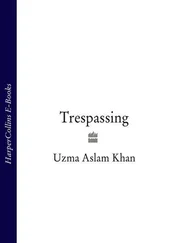“Why?”
“It might have been her father. He didn’t want her to come.”
“Neither did you.”
“My reasons were different.”
“What were his?”
“What do you think? It’s not safe . He wouldn’t hear otherwise. Telling an immigrant the country he left is not as he imagines is like telling a father the daughter who grew up is not as he imagines.”
He laughed. “We’ll be passing our glacier.”
I smiled. “I know.”
She’d text me messages. Did you hear about the bomb blast ? I’d text back: Don’t panic. Everything will be all right . She began fixating on Pakistan’s “border badlands” and our conversations were increasingly about al-Qaeda hideouts, suicide bombers, bearded fanatics. She decided that Pakistan was a place where women couldn’t survive. I asked what she thought 85 million Pakistani women were — unsurviving? Still the nervous texting didn’t stop. Another. That makes more than last year, right?
One day I sat at my desk, wondering how it happened. After establishing the need for me to accept her “return,” she was suddenly establishing the need for me to prevent it. How did that happen?
I logged on to the internet. A Yahoo! headline announced the terror threat was red. There was a message from Irfan with an image of a Predator unmanned aerial vehicle armed with Hellfire missiles, described as MALE. Medium-altitude, long-endurance.
I looked closely at the image. The drone was white, lean. It looked a little like a capsule I inserted into my rectum once, as a child, when I had worms. (Come to think of it, I’d seen something similar in Matthew’s pristine toilet: hemorrhoid suppositories.) The drone had wings, a tail. The tail was spinning, and I could feel the nerves of my rectum tingle, anticipating the speed with which I was about to get reamed.
It was taking off from a runway in Nevada, from a place called Cactus Springs. I liked the name. I liked how it could be read in many ways. It could be a declaration of the ability of cactus to leap, which some do, if you brush up against them. Or it could have nothing to do with movement. The cactus could be standing still, but in the middle of a well, or a fountain, or several fountains, all gushing copiously. Or it could be long seasons of cactus — entire years made up only of March, April, May.
This was how it worked.
There was a pilot who stayed on the ground. Once the robot plane was in the air, the pilot could set its path as it flew over Afghanistan and Pakistan, hunting for al-Qaeda fighters. Inside the drone was a camera capturing entire villages, where dark figures slid quickly into labyrinths, their shadows shifting, crisscrossing, into walls, into rooms, into each other. A target became a non-target, a non-target became a target. Before the camera could tell them apart, the world could be saved.
Beneath the photograph was a caption. If the target is taking cover or lying down the effect is reduced, but if it can be caught standing up or running then the full effective casualty radius of 200 feet will apply . It ended with a wistful afterthought. While a drone can drop two 500-pound bombs with each strike, its camera shows us images of daily life in an area most of us never think about .
To be the one looking up at that.
And to be the one at a Playstation in Cactus Springs, looking down on a land that wasn’t even down there, as you were about to destroy it.
A small part of me felt exhilarated at the power of the drone’s camera. (A large part of me felt exhilarated at the power of all cameras.) That bird’s eye view. My life as a pelican. Or an owl.
Irfan’s messages were increasingly concerned with where the unmanned planes were taking off from. Cactus Springs in Nevada, or Shamsi Airfield in Pakistan, near the Afghan border? Since the start of Operation Enduring Freedom, Shamsi was being used as a base for US Special Forces — that much was known. Prior to that, Irfan reminded me needlessly, it was used by wealthy Arabs to launch a different predator. Falcons. They were flown in on jets to hunt the endangered Houbara Bustard, a pheasant with aphrodisiac meat, though the real aphrodisiac was watching a falcon spray a Houbara’s feathers. (Falconry was forbidden to Pakistanis, yet Pakistan produced more falconry gear than any other country, all for its Arab patrons. Call it hospitality.) Ironically, since the start of the war and use of the airfield by US forces, the bustards could no longer be hunted on the same scale. But people could. Had Shamsi Airfield been gifted to the CIA to launch predator MALE? Irfan threw these questions at me.
As well as this detail: in the sand dunes near Shamsi lay another airbase that could, after a sandstorm, disappear for days. It was in these sands that, soon after the war began, a Pakistani shepherd found unexploded US cluster bombs. He kicked one by accident while herding his sheep. It tore apart his hands and legs and made the news and elicited anger. Since then, if any shepherd lost his limbs, even the story was lost.
I heard the ring in my pocket. A text from Farhana. Fourteen killed in a mosque. Why a mosque, Nadir ? I texted back, Um, ask God? I shut off my phone. I shut off my computer. I went for a walk.
I passed a newsstand. Kidnappings Traverse Border . I assumed it meant the Afghanistan — Pakistan border. But as I moved away, the word Mexico jumped out at me, and I thought, Oh —that border. Then I thought, Oh— this border.
I kept reading. Phoenix, Arizona, was becoming the kidnapping capital of America, and, outside Mexico City, of the world. The torture tactics of Mexico’s drug cartels — including ripping off hands and legs — had spread across the border. It concluded, Are we too obsessed with al-Qaeda to care about our own backyard? For California or Arizona, terrorists linked to the drug trade are a more immediate threat .
The article excited me. See! We’re not the world’s biggest danger! Mexicans are worse! Even if I look like both! I carried the paper all the way to Farhana’s house, as though for reward.
She said I was being racist. “Stereotyping Mexicans as drug dealers and violent gangsters is not a productive way of thinking. It engenders fear. Makes you think of fellow human beings as ‘them’.”
“And fear of Pakistanis?”
“Are you calling me racist?”
“Why would I?”
“Why aren’t you answering me? You know I’m sorry this is hard for you.”
“I am. You know I’m sorry you’re afraid, but we’re not going anywhere near the Afghanistan — Pakistan border.” (I thought fleetingly, we are the border.)
“I’m not. What should we have for dinner?”
“Okay then. Sushi?”
Later, she was in the mood. I wasn’t. We tried again in the morning. I was as floppy as ahi.
When she got out of bed, I asked the shadow between us if her “return” was a way to somehow purge her fear of the place she called home. A fear that had only recently been made known to me. A fear that would haunt us right till our departure in July (and, I was to find out, even after we arrived). She wanted a role in it, this home, but didn’t know what. It was still only March; the shadow stretched its limbs and bared its teeth and said nothing. On subsequent failed attempts — still no altitude or endurance — the shadow would only keep growing in length, as would its silence.
Did I finally hear the answer in July?
Was saving Kiran by dragging her into the boat the role?
A woman, a child, a voyeur. How quiet the confrontation. How murderous the gaze.
“Come with us in the boat,” said Farhana, bounding toward me from the shores of Lake Saiful Maluk.
Читать дальше












